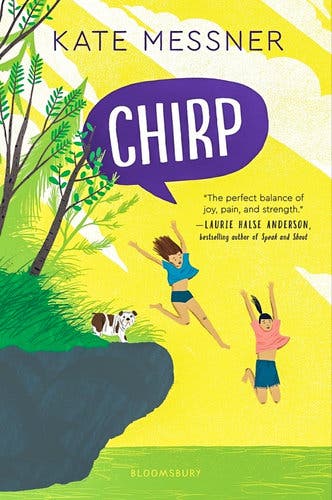In Kate Messner’s resonant, necessary CHIRP (Bloomsbury, 227 pp., $16.99; ages 8 to 12), 12-year-old Mia is on the mend — from a broken arm, after a fall from the balance beam, and more slowly, from the psychic scars left by a predatory coach.

Mia’s family is moving back to Vermont to support her grandmother, an entomology professor turned cricket farmer and an evangelist for the sustainable if unconventional protein. Recovering from a stroke, Gram is another woman on the mend — and she is also convinced that someone is trying to sabotage her cricket farm. Unlike her mother, Mia believes Gram, and sets out to figure out what’s going on.
Mia and her friends satisfyingly solve the mystery, and secure the business’s future while they’re at it. These interludes are charming, especially the Chirp Challenge, where the kids persuade newbies to try the flavored crickets (Maple! Crispy Cajun!) and to post selfies with the hashtag. But the mystery takes a back seat to the slow, two-steps-forward, one-step-back nature of healing itself. No neat resolution can change the fact that this once-fearless girl is inexorably changed.
The Mia we meet is muted — dulled and diminished by what has happened to her. We get to know her through a box of photographs and mementos that she unpacks in her new bedroom. Watching her begin to light up again, largely through contact with the other female characters, is one of the novel’s real pleasures.
She borrows swagger from her adventurous new friend Clover, and solves the mystery with the help of another, the robot wrangler Anna. She is inspired by a businesswoman who mentors her entrepreneurs’ camp, especially after the woman shares her #MeToo story. And Mia’s lovely connection with the high-energy, no-nonsense Gram is a source of sweetness throughout, even as the older woman withstands her own gaslighting.
Messner is the author of over 30 books for young readers, including “The Seventh Wish,” and her quiet authority is the perfect match for this material; right from the beginning, we know we’re in good hands. Without a whiff of sentimentality, Messner shows how the violation has systematically eroded Mia’s sense of herself.
Mia has lost her sport, and her community; by the time her arm heals, her friends have moved to a different level. She no longer trusts her own perceptions: Did she feel what she felt, or did she overreact? She is filled with self-recrimination: How could she fail to recognize the coach’s overtures as inappropriate? She comes to doubt her talent: Did he give her that Olympic pin because she was truly gifted, or because he was grooming her? And if Mia’s mother doesn’t believe Gram about the saboteur, how can Mia be sure she’ll believe her about the coach?
It’s tempting to call Chirp’s story timely. Of course, it’s the oldest story in the book — as Mia learns when she speaks up to protect a younger cousin, and her declaration opens a Pandora’s box of them: Every one of the women close to her, including her mother, her new best friend and her beloved Gram has her own story of an interrupted dream. (Messner is careful to note, in both the novel and an accompanying note, that a survivor is brave whether she speaks or not.)
At its heart, “Chirp” is a female-powered story about courage. “That’s what brave women do,” Gram tells Mia. “We keep going.” Mia will heal, but she can’t go back to the person she was. So she fakes bravery until she feels it, siphons strength from her friendships and close family connections, and reclaims those parts of her childhood she’s not ready to leave behind.
Messner never suggests that Mia is stronger at the broken places, though. This kid may be resilient, but she shouldn’t have to be.
 EU News Digest Latest News & Updates
EU News Digest Latest News & Updates



